人教版九年级英语Unit6知识点和测试练习
人教版九年级初三英语第六单元Unit6知识点+测试练习

Unit 6 When was it invented?一、句子背诵:①Someone stole my camera from my hotel room.②My camera was stolen from my hotel room.③My camera wasn’t stolen from my hotel room.④Was your camera stolen from your hotel room?⑤When was your camera stolen from your hotel room?二、知识点汇总:1. in style/ out of style2.please v. _______;_______→ pleasure n. ______________→pleased adj.(人)_______(It is ) a pleasure/ (It is ) my pleasure. 我的荣幸(是对方致谢时的答语;提供帮助后。
)--Can you help me carry the box?--With pleasure./ I would love to./No problem.--Thank you.--(It is ) a pleasure/ (It is )my pleasure.be pleased to do sth 愉快做某事be pleased with sth 对….满意It’s my _____________(please) to help you.他对这辆车很满意。
_____________________________.What pleased you best? _____________________________?3.Don’t mention it.(1)--I am sorry.-- Don’t mention it.(2)--Thank you.--Don’t mention it.4.by mistake----on purpose/ by design(反义词)5.nearly/ almost几乎,接近。
人教版英语九年级全册单元unit 6 知识点+测试卷+思维导图
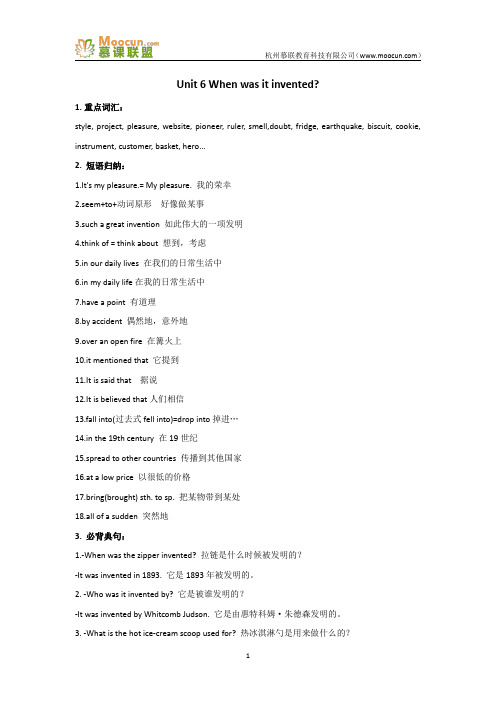
Unit 6 When was it invented?1.重点词汇:style, project, pleasure, website, pioneer, ruler, smell,doubt, fridge, earthquake, biscuit, cookie, instrument, customer, basket, hero...2. 短语归纳:1.It's my pleasure.= My pleasure. 我的荣幸2.seem+to+动词原形好像做某事3.such a great invention 如此伟大的一项发明4.think of = think about 想到,考虑5.in our daily lives 在我们的日常生活中6.in my daily life在我的日常生活中7.have a point 有道理8.by accident 偶然地,意外地9.over an open fire 在篝火上10.it mentioned that 它提到11.It is said that 据说12.It is believed that人们相信13.fall into(过去式fell into)=drop into掉进…14.in the 19th century 在19世纪15.spread to other countries 传播到其他国家16.at a low price 以很低的价格17.bring(brought) sth. to sp. 把某物带到某处18.all of a sudden 突然地3. 必背典句:1.-When was the zipper invented? 拉链是什么时候被发明的?-It was invented in 1893. 它是1893年被发明的。
2. -Who was it invented by? 它是被谁发明的?-It was invented by Whitcomb Judson. 它是由惠特科姆·朱德森发明的。
人教版九年级英语Unit6知识点精讲及练习题

新目标九年级Unit 6课前检测重点单词雄 重点短语三、 重点句子I. Did you know that tea, the most popular drink in the world after water, was inven ted by accide nt? 2」t is said that a chin ese ruler called she nnong was the first to discover tea as a drink.3.0ne day, she nnong was boili ng drinking water over an ope n fire. Some leaves from a tea plant fell into the water and remained there for some time.4」t is believed that tea was brought to Korea and Japa n duri ng thJca nd 7th cen turies.5」n England, tea didn ' t appear until around 1660, but in less than 100 years, in had become the n ati onal drink.6. The tea trade from china to western countries took place in the 19h century. This helped to spread the popularity of tea and the tea pla nt to more places around the world.7. Eve n though many people now know about tea culture, the chi nese are without doubt the ones who best un dersta nd the n ature of tea.8. Basketball is a much-loved and active sport that is enjo yed by many for fun and exercise.9. Whe n he was a college teacher, he was asked to thi nk of a game that could be played in the winter. 10He divided the men in his class into two teams and taught them to play his new game. Players on the same team must work together to get the ball in the other team' same time, they need to stop the competing team from getting the ball into their own basket.II. Today, the popularity of basketball has risen around the world, with many young people dream ing of beco ming famous payers. 1. have a poi nt ________________2. by accide nt _________________3. all of a sudde n ______________4. divide into _________________ 6. 发生 __________________ 7. 毫无疑问 ________________ 8. 错误地 _________________ 9. 不但……而且…… ______________5. look up to ______________10.把……译成…… _______________ sbas12. Basketball has not only become a popular sport to play, but it has also become a popular sport to watch.13. The nu mber of foreig n players, in clud ing chin ese players, in the NBA has in creased. These stars en courage young people to work hard to achieve their dreams.四、跟踪训练:1. ---When _____ the telepho ne ______ (in ve nt)?---1 thi nk it _________ (in ve nt) in 1876.2. ---What is the hot ice-cream scoop ______ (use) for?---It ' _____ (use) for serving really cold ice-cream.3. It __ (据说)that a Chinese ruler called Shen Nong was the first to discover tea as a drink.4. These stars_ ______ (鼓励)young people _________ (work) hard to achieve their dreams.知识梳理1. 一般过去时被动语态,构成was/were +及物动词过去分词如:The zipper was inven ted in 1893.2. 辨析pleasure, pleasant和pleased(1) pleasure,名词,意为“高兴,愉快”,常见用法:It' s a pleasure. / My pleasure. / With pleasure.不用谢,别客气。
新人教版九年级英语Unit6-Unit8单元知识重难点及练习

新版人教版九年级英语Unit6-Unit9Unit6 When was it invented ?一.短语归纳1.It's my pleasure.= My pleasure. 我的荣幸2.seem+to+动词原形好像做某事3.such a great invention 如此伟大的一项发明4.think of = think about 想到,考虑5.in our daily lives 在我们的日常生活中6.in my daily life在我的日常生活中7.have a point 有道理 8.by accident 偶然地,意外地9.over an open fire 在篝火上 10.it mentioned that 它提到11.It is said that 据说 12.It is believed that人们相信13.fall into(过去式fell into)=drop into掉进… 14.in the 19th century 在19世纪15.spread to other countries 传播到其他国家 16.at a low price 以很低的价格17.bring(brought) sth. to sp.把某物带到某处 18.all of a sudden 突然地19.less than少于,不到more than = over 超过20.without doubt 毫无疑问21.at that time 在那时 22.advise sb (not) to do sth建议某人(不要)做某事23.start doing sth 开始做某事 24.work on sth 致力于某事25.(be) similar to 与……相似 26.the Olympics 奥运会27.by mistake 错误地,无意地 28.make a mistake 犯错29.divide ...into…把…分成… 30.in the end = at last = finally 最后31.at the same time 同时 32.teach(taught) sb to do sth 教某人做某事e up with 想出 34.encourage sb. to do sth.鼓励某人做某事35.the purpose of ……的目的 36.stop sb from doing sth 阻止某人做某事37.look up to sb.钦佩某人 38.look up the word 查找单词39.work together 一起工作 40.I want to achieve my dream.我想实现梦41.My dream will come true.我的梦想会实现 42.work hard 努力工作43.on a hard floor 在坚硬的地板上 44.lead to导致 leader 领导,引路人45.Don't mention it.不客气,不用 46.translate...into....把…翻译成…47.be used for doing sth=be used to do sth 48.dream of doing sth 梦想做某事二.用法集萃1. be used to do 被用来做某事 be used as 被用作…be used by sb. 被某人使用2.help sb do sth.=help sb. to do sth. 帮助某人做某事3.make a decision to do sth.=decide to do sth.决定做某事4.make sb. + adj. 使某人怎么样make sb do sth使某人做某事be made to do sth 被使唤去做某5..in this way这样,用这种方式三语法全解1.some time 一段时间 sometimes 有时 some times几次 sometime 某个时候2.one of the world's favorite drinks世界最受欢迎的饮料之一.one of …之一,后面的名词用复数(一般要加S),动词用单数(一般要加S);favorite,最喜欢的,前面要用“谁的”. 3.thousand千hundred百million百万,当它们前面有数字的时候,它们本身不能加S,当它们后面有of的时候它们要加S,但前面的数字和后面的of不能同时存在4.not…until直到…才,I don‘t go to sleep until 11 every day.我每天直到11点才睡觉。
初中英语人教新目标九年级全册Unit 6基础知识检测(附参考答案)
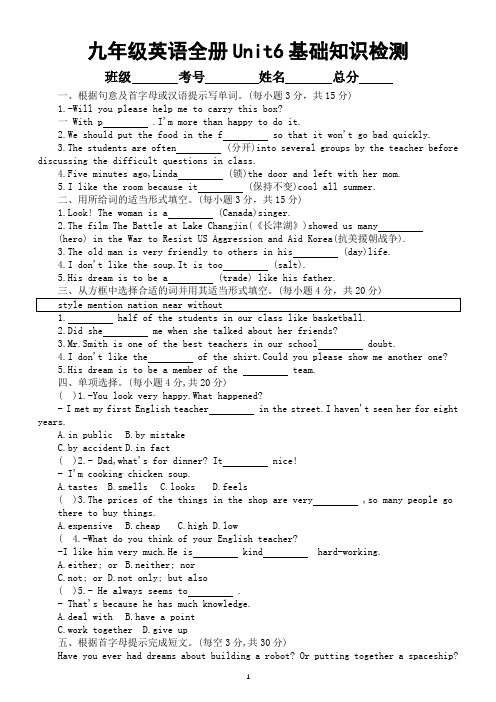
九年级英语全册Unit6基础知识检测班级考号姓名总分一、根据句意及首字母或汉语提示写单词。
(每小题3分,共15分)1.-Will you please help me to carry this box?一 With p .I'm more than happy to do it.2.We should put the food in the f so that it won't go bad quickly.3.The students are often (分开)into several groups by the teacher before discussing the difficult questions in class.4.Five minutes ago,Linda (锁)the door and left with her mom.5.I like the room because it (保持不变)cool all summer.二、用所给词的适当形式填空。
(每小题3分,共15分)1.Look! The woman is a (Canada)singer.2.The film The Battle at Lake Changjin(《长津湖》)showed us many(hero) in the War to Resist US Aggression and Aid Korea(抗美援朝战争).3.The old man is very friendly to others in his (day)life.4.I don't like the soup.It is too (salt).5.His dream is to be a (trade) like his father.1. half of the students in our class like basketball.2.Did she me when she talked about her friends?3.Mr.Smith is one of the best teachers in our school doubt.4.I don't like the of the shirt.Could you please show me another one?5.His dream is to be a member of the team.四、单项选择。
人教版九年级英语Unit6知识点精讲及练习题教学总结

新目标九年级Unit 61. heel _____________ 11. 风格____________ 21. 剩余__________2. scoop_____________ 12. 项目,工程_________ 22. 贸易__________3. electricity__________ 13. 愉快(n.)__________ 23. 疑问__________4. zipper _____________ 14. 每日的___________ 24. 冰箱__________5. accidental _________ 15. 网站_____________ 25. 翻译__________6. saint _____________ 16. 先锋____________ 26. 锁上__________7. crispy _____________ 17. 名单____________ 27. 地震__________8. salty ____________ 18. 提到_____________28. 饼干__________9. popularity __________ 19. 差不多__________ 29. 仪器__________10. professional _______ 20. 煮沸_____________ 30. 英雄__________二、重点短语1. have a point _________________ 6. 发生________________2. by accident __________________ 7. 毫无疑问_______________3. all of a sudden ________________ 8. 错误地________________4. divide into __________________ 9. 不但……而且……_____________5. look up to _______________ 10. 把……译成……_____________三、重点句子1.Did you know that tea, the most popular drink in the world after water, was invented by accident?2.It is said that a chinese ruler called shennong was the first to discover tea as a drink.3.One day, shennong was boiling drinking water over an open fire. Some leaves from a tea plant fell into the water and remained there for some time.4.It is believed that tea was brought to Korea and Japan during the 6th and 7th centuries.5.In England, tea didn’t appear until around 1660, but in less than 100 years, in had become the national drink.6.The tea trade from china to western countries took place in the 19th century. This helped to spread the popularity of tea and the tea plant to more places around the world.7.Even though many people now know about tea culture, the chinese are without doubt the ones who best understand the nature of tea.8.Basketball is a much-loved and active sport that is enjoyed by many for fun and exercise.9.When he was a college teacher, he was asked to think of a game that could be played in the winter.10He divided the men in his class into two teams and taught them to play his new game. Players on the same team must work together to get the ball in the other team’s basket. At the same time, they need to stop the competing team from getting the ball into their own basket.11.Today, the popularity of basketball has risen around the world, with many young people dreaming of becoming famous payers.12.Basketball has not only become a popular sport to play, but it has also become a popular sport to watch.13.The number of foreign players, including chinese players, in the NBA has increased. These stars encourage young people to work hard to achieve their dreams.四、 跟踪训练:1. ---When ______ the telephone _______(invent)?---I think it __________(invent) in 1876.2. ---What is the hot ice-cream scoop _______(use) for?---It ’s ______(use) for serving really cold ice-cream.3. It ____(据说) that a Chinese ruler called Shen Nong was the first to discover tea as a drink.(鼓励)young people _______(work) hard to achieve their dreams. was/were + 及物动词过去分词如:The zipper was invented in 1893.2.辨析pleasure, pleasant 和pleased(1) pleasure, 名词,意为“高兴,愉快”,常见用法:It ’s a pleasure. / My pleasure. / Withpleasure. 不用谢,别客气。
人教版九年级英语unit6短语和句型总结及练习

人教版九年级unit6短语、句型及练习(含答案)一、短语总结。
1、be invented in+地点/时间被发明于某时某地be invented by sb 由某人发明的2、shoes with adjustable heels 可调后跟的鞋3、change the style of sth 改变……的风格4、see in the dark 在黑暗中看路5、run on electricity 电动的6、operate on sb给某人动手术7、think of 想出,想到8、with pleasure 乐意效劳9、such+(a/an)+形容词+名词如此……10、think about (doing) sth. 考虑(做)某事11、be used for (doing) sth 被用来做某事be used by sb. 被谁使用be used as 被当作……使用be used to do sth 被用来做某事be/get used to (doing) sth. 习惯做某事used to do sth 过去常做某事12、by accident=by chance 意外地,偶然地13、by mistake 错误地make mistakes in sth 在某事上犯错mistake A for B 错把……当成……14、in the end=finally=at last最后,终于at the end of…在……末,尽头by the end of 在……末之前end up with 以……结束end up doing sht 结束做某事15、形容词/副词+enough 足够的……enough +名词足够的……16、seem to do sth 似乎要做某事seem like +名词似乎象……Seem that 从句似乎……17、for a long time 好长时间18、sprinkle A on B把……撒在……上19、not...until...直到……才20、at that time 在那时21、over=more than 多于22、according to根据23、It’s said that从句据说……24、some time 一些时间sometime 某时(将来)sometimes有时some times 几次25、boil drinking water烧开水26、over an open fire在户外篝火上in the open air在户外27、fall into 落入fall off 从……掉下来fall down跌倒fall over 摔倒fall in love with 爱上28、make tea 沏茶29、It’s believed that从句人们认为……30、decide to do决定作某事31、not...until... 直到……才……32、in this/that way这/那样33、take place (意料之中)发生34、the popularity of... ……的普及35、without doubt 毫无疑问36、throw sth away 把……扔掉throw sth to sb 把某物扔给某人37、in the1950s在二十世纪五十年代38、prefer ….to…..更喜欢39、at a low price 以低价40、steal...from...从……偷……41、translate...into...把……翻译成……42、notice sb do/doing注意某人做过/正在做43、all of a sudden 突然,猛地44、make sb./sth. +形容词使……怎么样45、change...into... 把……变成……46、in history 在历史上47、play indoors在室内玩48、stop...from... 阻止……做某事49、on the same team 在同一个对50、the safety of ...……的安全51、knock into sb撞到某人knock at/on the door敲门52、divide…into…把……划分成53、the aim of ………的目的54、try to do sth 尽力做某事try doing sth. 尝试做某事55、get ... into ...把……弄进……56、dream of/about 梦想做某事57、not only...but also... 不但……而且……(并列主语时,谓语的数由最近主语决定)58、the number of... ……的数量(做主语时,谓语用单数) a number of 许多……(做主语时,谓语用复数)59、look up to 钦佩,羡慕60、encourage sb to do sth 鼓励某人做某事二、重点句子总结。
人教版初中英语-九年级-unit6知识点+练习
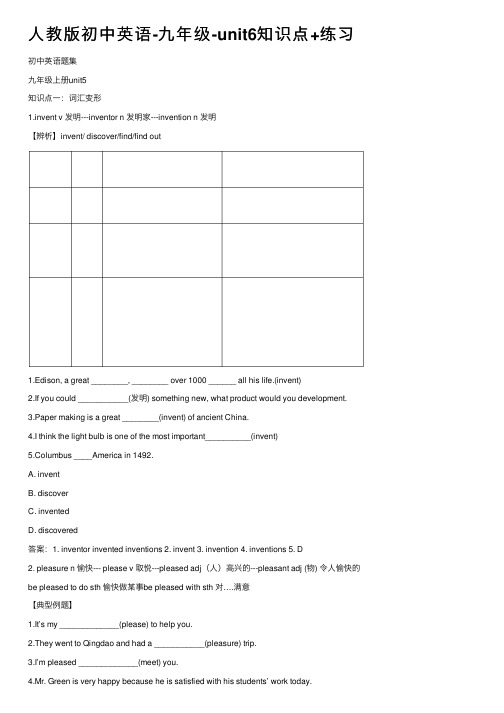
⼈教版初中英语-九年级-unit6知识点+练习初中英语题集九年级上册unit5知识点⼀:词汇变形1.invent v 发明---inventor n 发明家---invention n 发明【辨析】invent/ discover/find/find out1.Edison, a great ________, ________ over 1000 ______ all his life.(invent)2.If you could ___________(发明) something new, what product would you development.3.Paper making is a great ________(invent) of ancient China.4.I think the light bulb is one of the most important__________(invent)5.Columbus ____America in 1492.A. inventB. discoverC. inventedD. discovered答案:1. inventor invented inventions 2. invent 3. invention 4. inventions 5. D2. pleasure n 愉快--- please v 取悦---pleased adj(⼈)⾼兴的---pleasant adj (物) 令⼈愉快的be pleased to do sth 愉快做某事be pleased with sth 对….满意【典型例题】1.It’s my _____________(please) to help you.2.They went to Qingdao and had a ___________(pleasure) trip.3.I’m pleased _____________(meet) you.4.Mr. Green is very happy because he is satisfied with his students’ work today.A. is moved byB. is good forC. is fond ofD. is pleased with5. —Thank you for supporting the volunteer project.—________. Many hands make light work.A. My pleasureB. All rightC. Never mindD. That’s right 答案:1.pleasure 2. pleasant 3. to meet 4. D 5. A3. salty adj.咸的salt n “盐;⾷盐”→salty adj. 咸的【拓展】n +y = adj. Sun→ sunny cloud→ cloudy wind→ windy rain → rainy snow → snowy n+ ful = adj. u se →useful help→ helpful care → careful thankful感激的forgetful健忘的n + ly =adj. friend →friendly love→ lovely【典型例题】1.French fries taste_______(salt).2.I sprinkled lots of _______on them so they were really ______(salt)3.It's a____ day, isn't it? Let's do something special. (sun)4.She likes _______ cookies. They are hard dry and easily broken.A. saltyB. sweetC. sourD. crispy5.I want a sweet milk. Put some ______ in my cup, please.A. iceB. soupC. saltD. sugar答案:1.salty 2.salt , salty 3. sunny 4. D 5. D4. smell (1) n ⽓味a terrible smell 【记】small (⼩的) → smell(2) v → smelt →smelt +adj.闻起来smell terrible【典型例题】1.— How do you like the fish I cooked for you?—I haven’t had it yet. However, it ____ good.A. smellsB. tastesC. soundsD. feels2.Mum, what are you cooking? It ______ so sweet.A. tastesB. feelsC. soundsD. smells3.The bread smells _________ and it sells ________.A. well; goodB. good; goodC. good; wellD. well; well4.Mom is cooking dinner. It ______ so nice.A. smellsB. tastesC. feelsD. sounds答案:1.B 2.D 3. B 4. A5. accident n 事故--- adj accidental 意外的,偶然的by accident 偶然,意外地event & incident & accidentevent 通常指具有很⼤影响⼒的国内的、国际的或历史上的事件,也可以指运动会的⽐赛项⽬。
2020人教版九年级英语上Unit6知识点整理及例题讲解

【文库独家】Unit6 When was it invented ?目标认知重点词汇:1. invent 发明、创造2. operate操作、作业3. heat 加热、使变热4. crispy 脆的5. salty咸的6. sour酸的7. mistake错误8. accident事故9. ancient古老的、古代的10. notice注意到11. produce生产、制造12. pleasant合适的、令人愉快的13. throw扔、投14. taste味道、风味15. century世纪、百年16. active活跃的17. knock敲、击18. below 在...下面19. towards朝着20. develop 发展、发达21. risen rise的过去分词22. metal金属23. including包括、包含重点词组及句型:1. be used for 被用来做...2. by mistake 错误地3. by accident 意外地4. according to 根据5. fall into 落入、陷入6. in the end 在最后7. the number of...的数目8. in this way这样9. knock into撞上10. travel around 环游1. -What are they used for? 它们是用来做什么的?-They are used for seeing in the dark. 它们是用来在黑暗中照明的。
2. -When was the telephone invented? 电话是什么时候发明的?—I think it was invented in 1876. 我认为它是在1876年被发明的。
3. -What do you think is the most useful invention? 你认为最有用的发明是什么?-I think the most useful invention is computer. 我认为最有用的发明是电脑。
人教版九年级上册英语Unit 6 知识点过关及答案

人教版九年级上册英语Unit 6 知识点过关一.重点句子(15分)1.你知道茶是偶然间发明的吗?Do you know that tea ?2.据说一位叫神农的中国统治者最早发现了茶可以饮用。
that a Chinese ruler called Shen Nong wastea as a drink.3.人们认为,茶在六至七世纪传到了朝鲜和日本。
that teaKorea and Japan during the 6th and 7th centuries.4.孩子们不到十分钟就吃光了曲奇饼。
The cookies by the kids in10 minutes.5.拉链是什么时候发明的?was the zipper invented?6.它是由谁发明的?was it invented ?7.热冰激凌勺是用来做什么的?is the hot ice- cream scoop ?8.我们被分成四组做实验。
We' re four groups the experiment. 9.如今,许多年轻人都梦想成为著名的篮球运动员,篮球在世界各地也越来越普及。
Today, basketball has risen around the world, with many young people famous players.10.许多青少年仰慕这位著名的篮球运动员。
The famous basketball player by many teenagers.二、单元基础知识过关Ⅰ.单项选择(10分)( )1.— What should we buy for the picnic?— We'd better make a of things needed before going to the supermarket.A. listB. cardC. reportD. wish( )2. The potato chips have been in the paper bag for half an hour. They are not any more.A. crispyB. sweetC. saltyD. sour( )3. I could control my feelings at the moment. The movie reminds me of my childhood.A. reallyB. nearlyC. slowlyD. hardly( )4. The hot ice- cream scoop was invented a father and it is used scooping really cold ice- cream.A. with; forB. for; fromC. by; forD. by; from( )5. The government people to use public transport to go around because of the air pollution.A. encouragesB. warnsC. avoidsD. suggests( )6. It that the basketball was invented by James Naismith.A. believesB. believedC. is believingD. is believed( )7. Jenny found her keys when she cleaned her room.A. in personB. by accidentC. with pleasureD. without doubt( )8. My advice on how to save paper by my class last Monday.A. acceptsB. acceptedC. was acceptedD. is accepted( )9. Jane Peter is warm- hearted. They' re popular with our class.A. Both; andB. Not only; but alsoC. Neither; norD. Either; or( )10.—I had a good time in the study trip last week.A. With pleasureB. Thank youC. It's my pleasureD. I'm glad to hear thatⅡ.根据句意及首字母或汉语提示完成单词(15分)1. Her dress is out of s , so she wants to buy a new one.2. Would you please d the big apple into halves?3. It's too hot. You should put these foods in the f .4. This machine can t simple messages into 24 different languages.5. The meat is producing a terrible s . Throw it away.6. Peter became a manager, but Mike r a worker.7. Whenever I (提到) playing soccer, he always says he's too busy.8. Can you help me (烧开) some water?9. The young man is trying to be a (先锋) in the field of high technology.10. I’d like you to help me with the (项目) next week.Ⅲ.用括号中所给单词的适当形式填空(10分)1.I think you have put too much salt in the soup. It tastes quite ( salt).2. Please don't forget ( lock) your door when you go out.3. Music can offer ( please) to us, so many people like listening to it.4. Tea became the ( nation) drink of England in the 18th century.5. They were playing volleyball on the beach when it began to rain( sudden).6. The thief was seen ( enter) the mobile phone store.7. She didn't give up her dream of ( be) a dancer.8. As we know, ( Canada) speak English, too.9. The lady showed her ( music) talent at an early age.10. Knives are used for ( cut) things.Ⅳ.表达积累(10分)[主题:科技发明]阅读下面短文,在空白处填入一个适当的单词或括号内单词的正确形式。
人教新目标英语九年级 Unit6 知识点总结 单元练习题(含答案)

人教新目标英语九年级Unit 6. When was it invented?词汇知识部分1.单词唤醒(重在技巧记忆)n.电__________高兴;愉快__________样式;款式__________网站_________清单__________ 先驱者__________统治者__________顾客__________气味__________钟声__________英雄__________篮;筐__________受欢迎;普及__________项目;工程__________某人_________v.提到__________煮沸__________保持不变;剩余__________从事贸易__________疑问__________锁上__________翻译__________怀疑;疑问__________adj/adv.意外的_____________国家的;民族的_________职业的_________音乐的__________ 脆的__________咸的__________酸的__________突然的__________低的__________ 日常的__________几乎__________2.短语归纳(重在理解+运用)有道理______________偶然地______________错误地__________突然_____________毫无疑问_____________乐器_______________根据;按照_____________最后_____________ 一个叫布莱克的学生___________________习惯做某事________________掉入______________想出__________少于__________发生_________把......划分......_____________梦想___________3.重点句型(重在理解+活用)1. --- When was the car invented?---It was invented in 1985.2. ---When were electric slippers invented?---They were invented last year.3. ---Who were they invented by?---They were invented by Julie Thompson.4. ---What are they used for?---They’re used for seeing in the dark.语言知识部分1.invent (v.)发明;创造invent 指发明创造出自然界本来不存在的东西,如工具、方法、手段、汽车、电器、合成材料等。
人教版九年级全册英语Unit6 SectionA 知识讲解+专题练习学案(含答案)
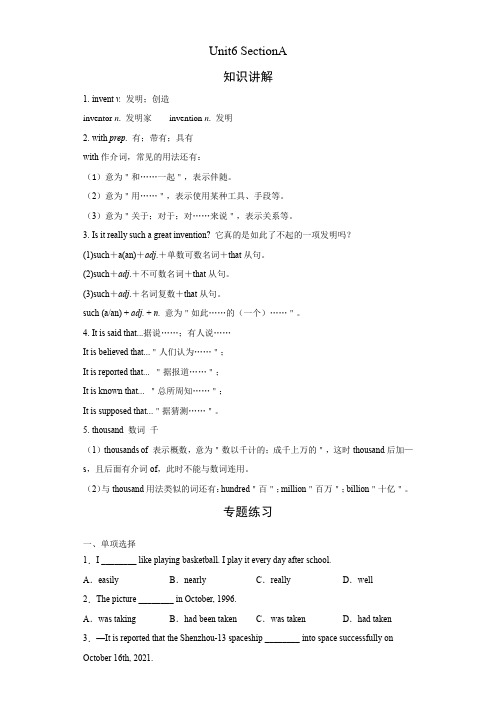
Unit6 SectionA知识讲解1. invent v.发明;创造inventor n. 发明家invention n. 发明2. with prep.有;带有;具有with作介词,常见的用法还有:(1)意为"和……一起",表示伴随。
(2)意为"用……",表示使用某种工具、手段等。
(3)意为"关于;对于;对……来说",表示关系等。
3. Is it really such a great invention? 它真的是如此了不起的一项发明吗?(1)such+a(an)+adj.+单数可数名词+that从句。
(2)such+adj.+不可数名词+that从句。
(3)such+adj.+名词复数+that从句。
such (a/an) + adj. + n. 意为"如此……的(一个)……"。
4. It is said that...据说……;有人说……It is believed that..."人们认为……";It is reported that... "据报道……";It is known that... "总所周知……";It is supposed that..."据猜测……"。
5. thousand 数词千(1)thousands of 表示概数,意为"数以千计的;成千上万的",这时thousand后加—s,且后面有介词of,此时不能与数词连用。
(2)与thousand用法类似的词还有:hundred"百";million"百万";billion"十亿"。
专题练习一、单项选择1.I ________ like playing basketball. I play it every day after school.A.easily B.nearly C.really D.well2.The picture ________ in October, 1996.A.was taking B.had been taken C.was taken D.had taken 3.—It is reported that the Shenzhou-13 spaceship ________ into space successfully on October 16th, 2021.— How proud we Chinese are!A.sent B.is sent C.was sent D.sends 4.Everyone is quite _______ to have a _______ trip.A.pleased; pleasant B.pleasing; pleasedC.pleasure; please D.pleasant; pleased5.They have bought more than 14,000 books since the library ________ last month. A.built B.will built C.was built二、完型填空It has been more than two thousand years since we began to use an umbrella on rainy days. However, people often felt not convenient to hold an umbrella while working. Then the rubber raincoat was invented by an Englishman named Macintosh in 1823.In 1492, Columbus, a well-known Italian voyager, 6 the New World—the American. He brought a lot of things to Europe from South America. Rubber was one of them, 7 people didn’t know its use at that time. In 1770, people found that the rubber could be used 8 erasers.Macintosh was a worker in an eraser factory in Scotland. One day he spilled(洒出)some rubber liquid(液体)over his clothes 9 when making erasers. He was too busy to clean it and went back home wearing the 10 clothes. On the way home, it rained heavily. Having no umbrella, Macintosh had to run home quickly. When he got home, he 11 the wet clothes. To his surprise, the area of the 12 with rubber wasn’t wet. “Why not make a rubber raincoat?” Macintosh thought. The next day he brushed the rubber liquid all over a coat. He wore the “rubber coat” on 13 days and took a walk in the field to test if it 14 really keep off the rain. 15 , the clothes inside the “rubber coat” weren’t wet at all. The rubber raincoat was created in this way by chance.The rubber raincoats soon appeared on the market. However, they were sticky in summer and hardened in winter. Year after year, people kept on improving the raincoats. Today raincoats are widely used in our daily lives.6.A.invented B.created C.described D.discovered 7.A.and B.but C.or D.if8.A.as B.to C.from D.by 9.A.slowly B.quickly C.carelessly D.carefully 10.A.new B.old C.clean D.dirty11.A.took off B.put on C.look out D.put off 12.A.body B.clothes C.house D.liquid 13.A.cloudy B.windy C.snowy D.rainy 14.A.might B.should C.could D.must 15.A.Especially B.Suddenly C.Surprisingly D.Normally三、阅读单选What is the most important invention of all time? Is it the written word that helps us to record information? Is it the telephone that lets us talk to people from all over the world? Is it the car that lets us travel at great speeds to meet others? Umberto Eco, an Italian writer, thinks it is something quite different. He says the most important invention might be bright in front of your eyes. He is talking about a simple pair of glasses.Modern eye glasses were invented around 1000 years ago. They were more than just a convenient way to read. Before glasses, writers, scientists or teachers who could not see properly had to memorize everything. After about ten years of poor eyesight, they could not remember well enough and could not work. Glasses meant that people could work in their old age.People who wanted to remember some information could write it down and read it. Eye glasses are one of the world’s greatest inventions and were probably worn by the people who designed the first telephones and cars.16.The invention of the written word is important because ____.A.we need it to listenB.we need it to record informationC.we just need it to read17.The author thinks ____ is the greatest invention of all time in his passage.A.the telephone B.the car C.a simple pair of glasses 18.From this passage, we can know ____.A.modern eye glasses were invented 100 years agoB.people who designed the first telephones and cars probably wore those glassesC.the author of this article is an American四、用所给单词的正确形式填空19.His body ______(find )in his wooden house this morning .20.A number of mail-in-ballots(邮寄选票) needed ________ (count) in several states during the US presidential election.21.It is said that the little boy _____(kidnap) last Sunday22.This book ________ (write) by Guo Jingming last month.23.The students didn’t understand the sentence until it ________ (explain) again.五、完成句子24.这个气球掉入水里,留在了那里。
初中英语 Unit6用法汇总+词法句法语法总结及练习人教版九年级全一册
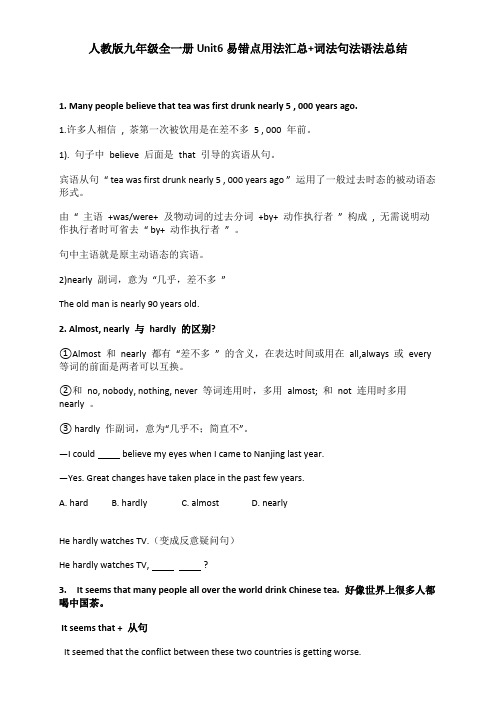
人教版九年级全一册Unit6易错点用法汇总+词法句法语法总结1. Many people believe that tea was first drunk nearly 5 , 000 years ago.1.许多人相信, 茶第一次被饮用是在差不多5 , 000 年前。
1). 句子中believe 后面是that 引导的宾语从句。
宾语从句“ tea was first drunk nearly 5 , 000 years ago ” 运用了一般过去时态的被动语态形式。
由“ 主语+was/were+ 及物动词的过去分词+by+ 动作执行者” 构成, 无需说明动作执行者时可省去“ by+ 动作执行者” 。
句中主语就是原主动语态的宾语。
2)nearly 副词,意为“几乎,差不多”The old man is nearly 90 years old.2. Almost, nearly 与hardly 的区别?①Almost 和nearly 都有“差不多” 的含义,在表达时间或用在all,always 或every 等词的前面是两者可以互换。
②和no, nobody, nothing, never 等词连用时,多用almost; 和not 连用时多用nearly 。
③ hardly 作副词,意为“几乎不;简直不”。
—I could believe my eyes when I came to Nanjing last year.—Yes. Great changes have taken place in the past few years.A. hardB. hardlyC. almostD. nearlyHe hardly watches TV.(变成反意疑问句)He hardly watches TV, ?3. It seems that many people all over the world drink Chinese tea. 好像世界上很多人都喝中国茶。
人教版九年级英语上册Unit6基础知识复习卷(含答案)
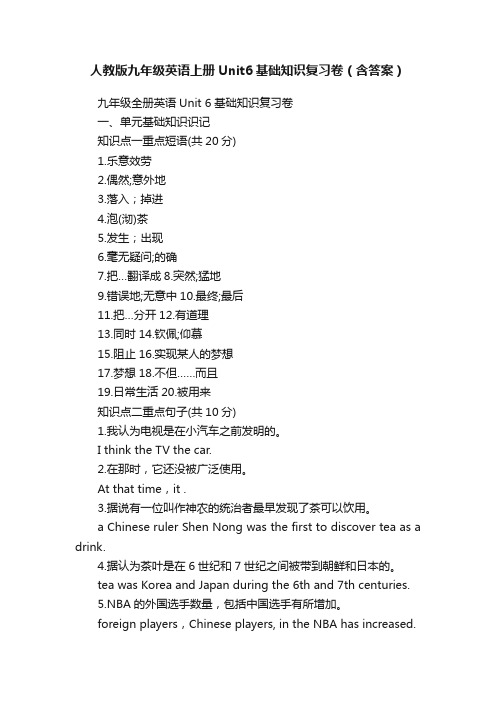
人教版九年级英语上册Unit6基础知识复习卷(含答案)九年级全册英语Unit 6基础知识复习卷一、单元基础知识识记知识点一重点短语(共20分)1.乐意效劳2.偶然;意外地3.落入;掉进4.泡(沏)茶5.发生;出现6.毫无疑问;的确7.把…翻译成8.突然;猛地9.错误地;无意中10.最终;最后11.把…分开12.有道理13.同时14.钦佩;仰慕15.阻止16.实现某人的梦想17.梦想18.不但……而且19.日常生活20.被用来知识点二重点句子(共10分)1.我认为电视是在小汽车之前发明的。
I think the TV the car.2.在那时,它还没被广泛使用。
At that time,it .3.据说有一位叫作神农的统治者最早发现了茶可以饮用。
a Chinese ruler Shen Nong was the first to discover tea as a drink.4.据认为茶叶是在6世纪和7世纪之间被带到朝鲜和日本的。
tea was Korea and Japan during the 6th and 7th centuries.5.NBA的外国选手数量,包括中国选手有所增加。
foreign players,Chinese players, in the NBA has increased.6.奈史密斯博士创建了一种能在室内硬地板上玩的游戏。
Dr Naismith created a game inside on a hard floor.7.这些明星鼓励年轻人努力学习,去实现他们的梦想。
These stars young people work hard their dreams.8.经常很难就某些产品的发明者做出决定。
It is often difficult the inventor of certain inventions.9.他们需要阻止对手得到球,投进他们自己的篮筐里.They need to the competing team the balltheir own basket.10.一些人质疑是否是发明者自己想出的这个主意。
2014人教版九年级英语unit6+When+was+it+invented重点知识点讲解及练习

Unit6 When was it invented?1、被动语态(1). 被动语态表示句子的主语是谓语动词所表示的动作承受者。
(2). 被动语态基本结构:be+及物动词的过去分词(如果是不用物动词,其过去分词应带有相应的介词)(3). 被动语态中的be 是助动词,有人称、数和时态的变化。
一般现在时被动语态为:am/is/are+过去分词一般过去时被动语态为:was/were+ 过去分词与情态动词连用的被动语态:情态动词+ be + 过去分词(4). 被动语态中动作的发出者或执行者做介词by的宾语,放在句末,by 表示“由,被”的意思2、如何理解被动语态?为取胜更清晰、更深刻地理解被动语态的含义,可以将主动语态和被动语态的句子结构进行比较。
主动语态:其他成分被动语态:+其他成分如:被动语态3. invent v. 发明inventor n. 发明家invention n. 发明可数名词4. be used for doing用来做…(是被动语态) 如:Pens are used for writing. 笔是用来写的。
Pens aren’t used for eating. 笔不是用来吃的。
5. 给某人某样东西give sth. to sb. 如:I gave a pen to him. 我给他一支笔。
give sb. sth. I gave him a pen. 我给他一支笔。
6. by mistake 错误地如:I took the umbrella by mistake. 我不小心拿错了雨伞。
7. make sb./sth. +形容词使…怎么样It made me happy. 它使我高兴make sb./sth. +名词让…做…It made me laugh. 它让我发笑8. not…until…直到…才做…如:I didn’t go to bed until I finished my work.9 quite 非常adv. 与冠词a连用时,冠词a必须放在它的后面如:quite a beautiful girl 一个漂亮的女孩very 非常adv. 与冠词a连用时,冠词a必须放在它的前面如: a very beautiful girl 一个漂亮女孩注:当不与冠词a 连用时,两者可以互用如:I am very happy.=== I am quite happy. 我非常高兴。
- 1、下载文档前请自行甄别文档内容的完整性,平台不提供额外的编辑、内容补充、找答案等附加服务。
- 2、"仅部分预览"的文档,不可在线预览部分如存在完整性等问题,可反馈申请退款(可完整预览的文档不适用该条件!)。
- 3、如文档侵犯您的权益,请联系客服反馈,我们会尽快为您处理(人工客服工作时间:9:00-18:30)。
人教版九年级英语Unit 6 When was it invented ?一、Knowledge Summary1. C an you / C ould you ……?你能……吗?肯定回答:Sure,I’d love / like to. / With pleasure.否定回答:Sorry,I can’t. / I am sorry, but…2. such + a/an + adj. + n. so + adj. + a/an + n.some / any / no + such + n. so many / much / few / little + n.It is really such a great invention.I am sorry that I have no such books.My father bought so lovely a dog.He has so many books in his room.3. Well, you do seem to have a point. 有道理,表示赞同别人的看法或观点You have a point there. = I agree with you.4. how tea was invented by accident. 茶是怎么被偶然发明的by accident 偶然地,意外地I met her by accident in a crowded car.5. it is said that…据说,有人说It is said that they have won the game.类似的句型还有,it is be lieved that……人们认为it is reported that 据报道It is known that……众所周知……it is supposed that 据猜测6. 辨析some time,sometimes,some times与sometimesometimes频率副词,有时,提问用how oftensome times 几次,几倍提问用how many timessometime 某时,表示不确切或不具体的时间,提问用eg. I need some time to do my homework.She comes to visit us sometimeLucy has been to Beijing some times.Jack will leave for America sometime next week.7.one of the world‘s favorite drinks was inventedone of 后接复数名词,意为“……之一”,做主语时后面的动词用单数。
One of them is good at English.8. a few thousand years later / two thousand / two thousand students①thousand 前表示不确切数目的词,如a few, some, several 等,thousand②表示确切的词时,用基数词加thousand③thousand与具体的数字连用时,其后不加s,也不能与of连用④thousand与of连用时,表示不确切的数目,其后要加s9. The tea trade fromChina to Western countries took place in the 19th century.take place 发生,出现,举行有被动语态,一般指非偶然性的事件发生happen 发生,碰巧没有被动语态和进行时态一般用于偶然或突发性事件in the 19th century 在19世纪in the 1980s 在20世纪80年代10. the popularity of ……的普及This helped to spread the popularity of tea。
11. without doubt 毫无疑问,的确12. at a low price 以低价13. translate……into 把……翻译成Different writers translated the book into different languages.14. Potato chips were invented by mistake.(错误地,无意中)15. in the end 最后,最终at the end of 在……尽头,在……结束时by the end of 在……以前,到……为止16. divide into… →被动为:be divided intodivede the man into two teams17. At the same time, they need to stop the competing team from getting the ball into their own basket.need to do 需要做某事at the same time 同时stop from doing sth. 阻止做某事18. dream of / about doing sth. 梦想做某事Many young people dream of becoming famous players.19. Many young people look up to these basketball heroes and want to become like them.look up to 钦佩,仰慕hero复数为es ( 黑人Negro英雄hero爱吃西红柿tomato土豆potato)20. These stars encourage young people to work hard to achieve their dreams.encourage to do sth, 鼓励某人做某事achieve one’s dream 实现某人的梦想21. a professional basketball player二、Grammar Focus一般过去时的被动语态1.构成:主语+was/ were + 动词过去分词+其他The desk was made by my father yesterday.They were invented by Julie Thompson.否定句:主语+was/ were not + 动词过去分词+其他一般疑问句:Was/ Were +主语+ 动词过去分词+其他?肯定回答:否定回答:三、当堂测验1.The car is ______ a great invention. We can’t imagine the life without it.A. soB. suchC. enoughD. too2.You’re a popular girl, Grace, and a lot of young people ______ you.A. look afterB. look up toC. look upD. look for3. The teacher seemed _______ angry. Let’s stop talking to listen to him carefully.A. getB. gettingC. to getD. got4. The shoes with special heels are in the newest ______. Many girls wear them.A. brandB. tradeC. styleD. product5. —So kind of you to give me a ride to the station.—_________A. Never mind.B. My pleasure.C. It doesn’t matter.D. Glad you like it.6. So many trees and beautiful flowers _____ in this area in 2014.A. were plantedB. was plantedC. are planted7. ______ my brother ______ I am going to the basketball game tonight because we both love basketball a lot.A. Both; andB. Neither; norC. Either; orD. Not only; but also8. —Sorry, sir. But is this your umbrella?—Oh, sorry. I just took it ______. Mine is under the seat.A. for yourselfB. by mistakeC. in personD. at last—Where are you going to stay when you get to Shanghai?—I may live in a hotel in a friend’s house.A. both; andB. either; orC. neither; norD. not only; but also9. —was the car invented? —In 1885.A. WhereB. WhenC. WhatD. How10. —Jane, how can I learn English well?—You should do more reading practice listening.A. neither; norB. not only; but alsoC. either; orD. between; and11. Two students to the opening ceremony last Friday.A. hundreds; were invitedB. hundred; were invitedC. hundreds of; invitedD. hundred of; invited12.—He always appears to.—That’s because he’s really knowledgeable and experienced.A. make an effortB. have a pointC. pull togetherD. take place按要求完成句子1. It was invented in 1854. (对画线部分提问)it ?2. The machine was invented by the engineer. (对画线部分提问)the machine invented ?3. Mike seemed to know everything. (改为同义句)Mike knew everything.4. He is such a brave man. (改为同义句)He is a man.5. The knife is used for cutting things.(对画线部分提问)the knife ?词语运用阅读短文,从方框中选择适当的词并用其正确形式填空,使短文通顺、意思完整。
